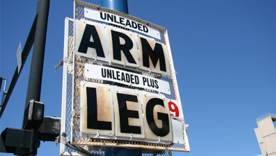- MENU
- HOME
- SEARCH
- WORLD
- MAIN
- AFRICA
- ASIA
- BALKANS
- EUROPE
- LATIN AMERICA
- MIDDLE EAST
- United Kingdom
- United States
- Argentina
- Australia
- Austria
- Benelux
- Brazil
- Canada
- China
- France
- Germany
- Greece
- Hungary
- India
- Indonesia
- Ireland
- Israel
- Italy
- Japan
- Korea
- Mexico
- New Zealand
- Pakistan
- Philippines
- Poland
- Russia
- South Africa
- Spain
- Taiwan
- Turkey
- USA
- BUSINESS
- WEALTH
- STOCKS
- TECH
- HEALTH
- LIFESTYLE
- ENTERTAINMENT
- SPORTS
- RSS
- iHaveNet.com: Autos
Tom Ripley

If you throw a line in the water and a fish bites the hook, do you think you’ll make a catch every time you go fishing in that same spot?
You may be wondering what this has to do with cars and fuel prices.
Well, if you look at the trends over the past several decades, you will quickly see that consumers are pretty unsophisticated when it comes to dealing with fluctuations in fuel price. Our present situation is a case in point.
Just as they have done so several times through the years, fuel prices have jumped up once again. It is not that the world is running out of petroleum -- at least not any more than we were two months ago before the latest price surge hit. As is usually the case, an outside influence is behind the relatively quick price run-up. The wave of unrest in the Middle East has boosted current oil prices, largely because there are fears that one or more oil-producing countries in that embattled part of the world will stop supplying crude. On top of that, economic activity seems at long last to be picking up some, and the spring driving season is nearly upon us. So fuel prices are up. In some areas of the United States, gasoline is nearing $4.00 a gallon and diesel fuel has already exceeded the $4.00-a-gallon mark.
All of this occurred in very similar fashion about three years ago. Then, the one-time event that triggered the price jump ended, and prices fell. The recession that quickly followed deadened economic activity and kept prices low until the Middle East started to go up in flames in the past few weeks. So, yes, we have seen this before -- but to many consumers, the whole process seems utterly new. Why do we say that? Well, just as they have in years past, consumers have responded to the increases in prices at the pump by shifting their attention to more fuel-efficient vehicles. An obvious example of this is activity on the Internet, where auto-buying and information sites have already reported much greater consumer interest in smaller cars, hybrids and electrics.
In February alone, consumers’ experience with the new higher prices for fuel -- plus the media’s focus on the increases -- influenced them to seek out information on more fuel-efficient vehicles. Internet traffic to sources of information about hybrids and electrics jumped some 75 percent during that period, while interest in compact cars as a segment blossomed 45 percent in the same period. Higher sales of compact, hybrid and electric cars are sure to follow.
What is most interesting is this is a recurring pattern. It is possible to predict with great confidence that, if fuel prices keep increasing, compact and hybrid-electric vehicles will become more popular -- and larger, less fuel-efficient cars will be out of favor. Pricing for small cars will likely go up; pricing for larger vehicles will go down. The rule of thumb is simply this: If consumers experience an increase in fuel prices as they recently have, they’ll automatically expect that fuel prices will continue to rise -- even though history has shown us that will not be the case. Further, the vehicles they choose to purchase are selected on the mistaken assumption that fuel prices will rise in a largely unending trend. The quick takeaway: If you are considering purchasing a large vehicle, like a truck or an SUV, the next few weeks may be prime time to get a great deal.
Tom Ripley is a Driving Today contributing editor who writes about vehicle ownership costs, auto industry trends and the human condition from his home in Villeperce, France.
Copyright © iHaveNet. All rights reserved.
Driving Today Auto Review - As Fuel Prices Rise, Small Cars Get Hotter